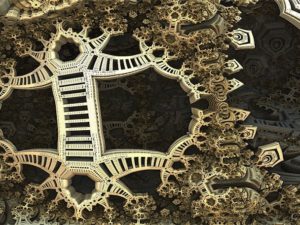
By Vajra Chandrasekera
To honour old arguments over the 1992 shortlist, I began by ruling out all books with spaceships on the cover. Most of these I don’t regret losing, except Yoon Ha Lee’s Ninefox Gambit, which I’m actually reading right now and enjoying very much―but not as one of my shortlist picks, alas! Rules are rules.
Second, I borrowed one of Megan’s rules and discounted books by everyone who’s won a Clarke before.
Third, I left out some books that I find intriguing but felt would be redundant of me to select, like The Underground Railroad, A Field Guide To Reality, Central Station, or The Fifth Season, which are already getting substantial attention from the sharkes. The fins are circling, as it were. (If time and circumstance permit, of course, I might write about these and other books that I’d read or considered anyway, even if briefly.)
Fourth, I ruled out all the books I’d already read, because reading new books is a big part of the fun of this project for me.
If this all seems a bit arbitrary, it certainly is. In my intro post I talked about the joys of freedom from responsibility in this project, and I’m exploiting that as much as possible.
My shortlist:
- Songshifting — Chris Bell (wordsSHIFTminds)
- The Man Who Spoke Snakish — Andrus Kivirähk (Grove Press UK), translated by Christopher Moseley
- Death’s End — Cixin Liu (Head of Zeus), translated by Ken Liu
- Empire V — Victor Pelevin (Gollancz), translated by Anthony Phillips
- The Core of the Sun — Johanna Sinisalo (Grove Press UK), translated by Lola Rogers
- The Arrival of Missives — Aliya Whiteley (Unsung Stories)
The six authors are from six countries: the books include four translations, a novella, and the only self-published novel on the submissions list. Obviously this is neither an attempt to predict the official Clarke shortlist (since there’s an official competition underway for that), nor even to imagine a plausible alt-universe official shortlist (there being several of those already via my fellow jurors, and some degree of consensus already forming via the overlaps in our selections) in that this selection mixes likely candidates with less likely ones. Rather, I’m using my shortlist to push the boundaries of that consensus a little bit and bring a few more books into the conversation. And perhaps to adopt a slightly orthogonal perspective of the field―in cross-section rather than a bird’s-eye view, maybe. This is also an acknowledgement that the shadow shortlists are fundamentally unlike the official shortlist in that ours are multiple by definition, which gives us interesting effects both in the points of overlap and in the lonelier spaces between them. The existence of multiple shortlists allows us to play off each other’s selections, set up resonances, compensate for absences, and most interesting of all, to choose different frameworks to read with.
So I’ve also tried to select books that I think would be interesting to read through the particular framework that I want to think and write through: the idea that the core tradition of science fiction is a literature of resistance to empire―a tradition with its early roots in, say, Kylas Chunder Dutt and Martin Delany―which refuses the hegemonic formal constraints of the mimetic novel, and eventually builds a toolkit of refusals against the three great constraints of realism: location, selfhood, and physics. And of course, the mirror-tradition with which it is inextricably entangled, the counter-science-fiction of using those same tools to magnify empire and domination instead. It seems to me that all six of these books (and not a few of the others, too) should be interesting, and hopefully entertaining, to read through this frame.
*
Vajra Chandrasekera is a writer from Colombo, Sri Lanka, and a fiction editor at Strange Horizons. His short fiction has appeared in Black Static, Clarkesworld, and Lightspeed, among others. He blogs occasionally at vajra.me and can be found on Twitter at @_vajra.
2 Comments
-
In this timeline, Cixin Liu’s Hugo win a couple of years ago was a lightbulb-recognition moment: anglophone speculative writing is in the doldrums, other traditions are where it’s out. And so the neophilic urge turns outwards, and the Clarke leads the charge. The award’s nominees still range (as they ever have) from hard SF to satire, but the judges are felt to be prioritising that twist of voice, that variation in emphasis and vocabulary that marks a story as “not from around here.” Once upon a time it was a source of pride that the Clarke shortlist was filled with British writers; now, if that were to be the case, it would be a source of shame. Which is all well and good, for the most part — although some commentators suggest that there is something uncomfortably territorial, proprietorial, about the field’s new attitude. They wonder whether some of the books are being recontextualised more thoroughly than is really appropriate; and they worry too about the vagaries of fashion, about works from non-anglophone writers having a moment rather than becoming really integrated into the field. But given the historical biases of the field as it existed until Liu, most people see that as a good problem to have.
-
An interesting future! I feel like I need to read this list to get a sense of what is going on in it. I guess part of my motivation for my list (and generally working mainly on British fiction) is to say the Anglophone world isn’t trump brexit, which is a potential liberal trap (not that I would ever define myself as liberal in the European sense). But in the wider sense, what is happening in the UK/US may look irrelevant in a few years’ time or simply a reaction to a global change that has already happened. Maybe a global-local analysis can be produced by imaginatively reading some of these timelines alongside each other. I’m also intrigued by Niall’s analysis of the Hugo as marking a turning point – that is definitely something that has to be discussed in relation to the Clarke.


